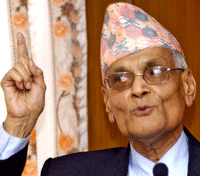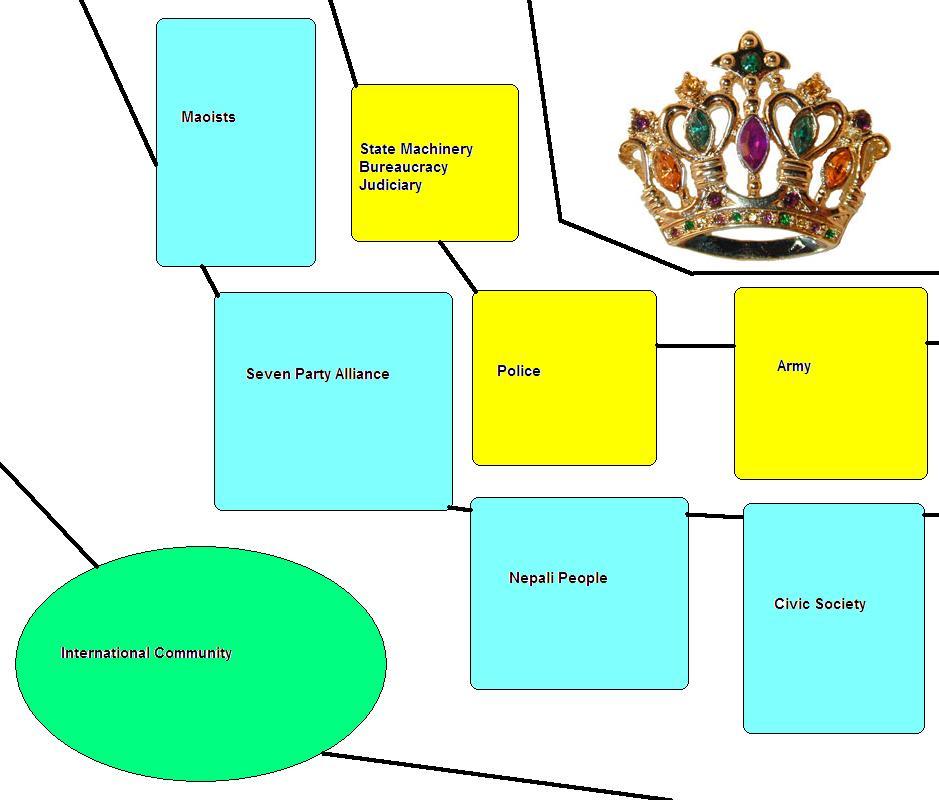
I am for talking. What do we have to lose?
A few days back I criticized Girija Koirala for wanting to talk to the regime. (Koirala's Request To The Regime To Postpone Elections) Now I think I was wrong, Girija was right. We got to talk.
Tulsi Giri Interview
Tulsi Giri Is Beyond Redemption
Response To The Panchayati Ghost Tulsi Giri
This guy Tulsi Giri is quite a character. There is not one major world power he has not criticized. He criticized India for inviting the Bhutan king to its Republic Day, and that was way back in February. He has taken the US and UK to task. There is another doctor-politician I know of who is known for his bluntness, Governor Howard Dean. Do they teach these people something at medical school? I wonder.
Some of the things Giri has said are outlandish, like his threat of jail time to the politicians. We threaten him with jail time right back, and then we still talk. Giri is not exactly a democrat.
What do I read into his words? He came out claiming the 12 point agreement between the Maoists and the democrats does not bother him. Only a few days later, he sounds like he does care. He is worried. Girija provided Giri with a slight opening, and he took it with gusto. That shows Giri is worried about the agreement.
But I am against pushing his nose in the dust. You help your opponent save face if you intend to do business.
I disapprove of the king but I also try to understand him. If we were to give him the benefit of doubt, what do we see? He did not invent Article 127. He overstretched it, true. If a near takeover of the country by an armed rebel group is not an emergency situation, what is? I am not justifying him, I am just trying to put myself into his shoes. And until the country gets another constitution, the 1990 constitution is the law of the land. The king has disfigured that constitution beyond recognition and repair, but that is a whole different topic.
My point is this. Either the seven party alliance should seek an overthrow of the monarchy like in France and Russia, or it should negotiate its way to a constituent assembly. Those are the only options I see.
My preference is a constituent assembly. Even if the monarchy is to be overthrown, I want it to be done through the ballot box. That decision is for the Nepali people to make. But if the seven party alliance were to opt for the France, Russia option, I will fully support it. They are the ones on the ground, I am not. I follow their lead. (The King Is Intent On Visiting France And Russia)
But decisions have to be made. The seven party alliance needs to be banging heads more. Tulsi Giri is right in his criticism. Seven parties are talking seven different ways. Leaders within the same party - the Nepali Congress - are not talking with one voice. That might be freedom of speech, but that is not unity of purpose.
Considering I don't see the seven party alliance anywhere near the France, Russia option, I am assuming we are still set on the constituent assembly idea. As long as we get there, does it matter how we get there? I think not.
And that is why we should be as flexible as possible.
We should not abandon the constituent assembly. As soon as we do that, we lose the Maoists, and we are back to square one. Personally I am for a constituent assembly with or without the Maoists.
Our commitment has to be to a constituent assembly. And that commitment has to be strong. Only then will we be flexible on every other issue.
First, clean the house. Bang heads and clear up heads. Giri is right. What do we want? Do we want to go back to before October 2002? Do we want to revive the House? What?
I think the last mile marker the seven party alliance has is the 12 point agreement. (10 Point Agreement To Succeed 12 Point Agreement, Prachanda Statement) I am not surprised Giri rejects that outright. Bijukchhe was also offended he was not consulted before it got signed. Giri was not part of the deal making, so he does not recognize the end product.
You make peace with enemies, not with friends. Giri is an enemy, that is why we need to talk to him.
We win if he talks reasonable. We win if he talks unreasonable: we expose him. But talks, by definition, will involve give and take. We can not show up at his door with a finished copy of an agreement and expect him to come around to it.
What could Giri ask for?
First, he will ask for clarity. Fair enough. Then he will say House revival is not an option. Then he will say, come take part in the February 8 polls. We say, no thanks.
Then he might say, both the Maoists and the seven party alliance are for House revival as long as that House takes the country to a constituent assembly. That is true. Then he might say, how about this? Forget the House revival and forget municipal polls. Instead let's hold elections to a new House, and let all the parties take part. Like now. Within a month or two. And then let that House deal with the Maoists.
I think that would be a valid compromise. The Maoists will also have to agree to it, because it goes along with the 12 point agreement. That House will give birth to an all party government. That government will hold peace talks with the Maoists, and head on towards a constituent assembly.
Am I for this idea? No. I am for the formation of an all party interim government through political decision. But considering the seven parties will not let go the House revival idea, I think this would be a valid compromise. We end up with a House, but there is no House revival. The king is out of the picture. Both the legislative and the executive come back to the political parties. The parties might even amend the constitution to bring the army under the parliament before holding talks with the Maoists.
I am not really proposing a roadmap here. What I am saying is once you engage in dialogue, all sorts of options open up.
Political dialogue is how you make political progress. Endless mass meetings will not do what political dialogue will. So go talk.
10:43 PM Update: I just talked to Madhav Nepal. I ran this idea with him. He disagreed. He said to hold elections to a House would be to lose the Maoists. Besides elections will be costly. If elections are to be held anyways, why not elections for a constituent assembly? Valid point.
Nepal sounded excited about all the massive rallies his party has been holding all over the country. He gave a long list of towns where they have been and were going to be.
I opened up a private e-channel of communication with him yesterday. It is direct, it is cheap. It works even when I can not reach him over the phone. It is efficient. It will basically be a series of memos. In private you open up more.
In The News
Government can consider parties’ proposal: VC Giri NepalNews ..... the government could consider the demand of political parties to postpone the municipal polls if the political parties come with a positive attitude...... first and foremost, the parties should make their stance clear and only then the government may agree to postpone the municipal polls...... political parties must be clear in their motive whether they want dialogue to postpone the municipal polls or postponement of municipal polls for dialogue ...... Girija Prasad Koirala called on the government to postpone the municipal elections so as to create an environment conducive for dialogue with the parties....... “However, the government can sentence the political leaders to jail if they try to disrupt the municipal polls. We can term them fanatics and send them to jail if they start talking too much” ...... had ruled out any consensus with the agitating seven-party alliance on the basis of the 12-point understanding ....... “The Feb 1 royal proclamation will not be withdrawn and the dissolved parliament will not be revived.” ...... Giri also said that the top leaders’ statements are inconsistent.....
Government can consider parties’ proposal: VC Giri Nepali Times, Nepal .....
Political Parties Won't Come to Power Now: Dr Giri
MR Josse: Straight shooting by Dr Giri Scoop.co.nz (press release), New Zealand
Dr. Tulsi Giri, Nepal’s royal deputy, organized a news ... United We Blog, Nepal







